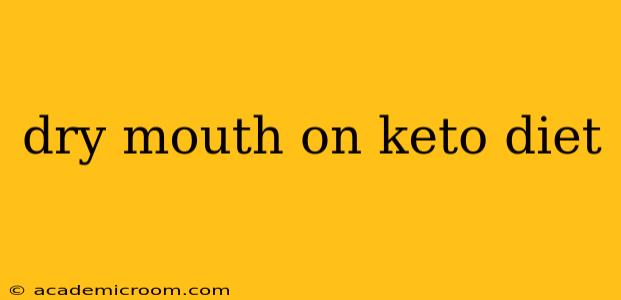The ketogenic diet, a high-fat, very-low-carb eating plan, has gained popularity for its potential weight loss benefits. However, some individuals experience unpleasant side effects, and dry mouth is a common one. This comprehensive guide explores the reasons behind keto-induced dry mouth, offering effective solutions and preventive measures to help you navigate this challenge while staying committed to your keto journey.
Why Does Keto Cause Dry Mouth?
The primary reason for dry mouth on the keto diet is electrolyte imbalance. When you drastically reduce carbohydrate intake, your body shifts from using glucose to using ketones for energy. This metabolic change can lead to a loss of fluids and essential electrolytes like sodium, potassium, and magnesium. These electrolytes play a crucial role in maintaining proper hydration and saliva production. Dehydration, a direct result of this imbalance, is a major contributor to dry mouth.
How Can I Tell If My Dry Mouth is Keto-Related?
Differentiating between general dry mouth and keto-related dry mouth often comes down to context. If you've recently started a ketogenic diet and are experiencing persistent dryness in your mouth, coupled with other keto flu symptoms like fatigue, headache, or constipation, it's highly likely the diet is the culprit. Keeping a food and symptom diary can help track the correlation between your diet and dry mouth.
What are Other Potential Causes of Dry Mouth on Keto?
While electrolyte imbalance is the most common cause, other factors can contribute to dry mouth on the keto diet:
- Dehydration: Restricting carbohydrate intake can lead to increased urination, resulting in dehydration if water intake isn't adjusted accordingly.
- Medication side effects: Certain medications can cause dry mouth as a side effect, and this effect might be exacerbated by the keto diet.
- Underlying medical conditions: Conditions like Sjogren's syndrome, diabetes, or even sleep apnea can contribute to dry mouth independently of the diet.
How Can I Treat Dry Mouth on Keto?
Addressing dry mouth on keto requires a multi-pronged approach focusing on restoring electrolyte balance and increasing hydration:
- Increase Electrolyte Intake: Supplementing with electrolytes, especially sodium, potassium, and magnesium, is crucial. You can find electrolyte supplements specifically formulated for keto diets. Consider adding a pinch of salt to your water or broth.
- Hydrate Adequately: Drink plenty of water throughout the day. Aim for at least half your body weight in ounces. Electrolyte-enhanced waters can also be beneficial.
- Consume Electrolyte-Rich Foods: Incorporate foods naturally rich in electrolytes, such as avocados, spinach, and coconut water.
- Avoid Dehydrating Substances: Limit caffeine and alcohol consumption, as these can contribute to dehydration.
Can I Prevent Dry Mouth on Keto?
Preventing dry mouth on keto involves proactive measures taken from the outset:
- Gradual Transition: Instead of abruptly switching to a keto diet, gradually reduce carbohydrate intake to allow your body to adapt more smoothly. This can lessen the severity of initial side effects.
- Monitor Electrolyte Levels: Regularly monitor your electrolyte intake and adjust accordingly based on your needs and symptoms.
- Prioritize Hydration: Make hydration a priority from the start of your keto journey. Keep a water bottle handy and sip throughout the day.
How Long Does Dry Mouth Last on Keto?
The duration of keto-related dry mouth varies from person to person. For some, it resolves within a few days as the body adapts. For others, it might persist for several weeks. If the dry mouth is persistent or severe, consulting a doctor is advisable to rule out other underlying medical conditions.
Are There Any Long-Term Effects of Dry Mouth Related to Keto?
Persistent, untreated dry mouth can lead to dental problems, such as cavities and gum disease. Therefore, maintaining good oral hygiene and addressing the underlying cause of dry mouth are crucial for long-term oral health. Regular dental check-ups are also recommended.
By understanding the causes, implementing effective solutions, and taking preventive measures, you can effectively manage dry mouth while successfully following the ketogenic diet. Remember, listening to your body and seeking professional advice when needed are essential for maintaining both your health and your dietary goals.
